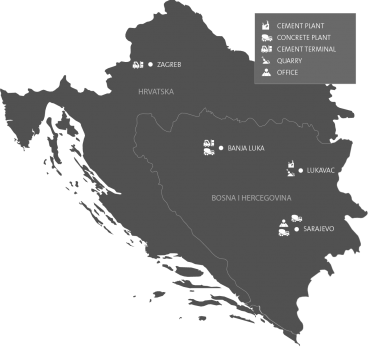BiH has a great Potential for reprocessing of a Waste into alternative Fuels
Cement plant Lukavac is investing in the installation of new technologies with the aim to protect the environment. Burning of waste in the cement industry is not harmful to the environment
According to the information from the Centre for Ecology and Energy, only in Tuzla Canton area 400-500 tons of waste are produced per day, which makes about 1 kg per capita. Unless the waste management is seriously taken into account, in 36 years Tuzla Canton could be covered with waste at a high of 1 meter. Expressed in quantities, by 2020, the Canton would have a stock of 1,000,000 tons of municipal waste, out of which 60% of the total quantity would be disposed, while the rest of the waste would end up in so-called illegal dumps.
Bosnia and Herzegovina has a great potential for waste processing and turning it into alternative fuels. Many things Many of the things people throw into containers, which later end up in landfills, are the main source of alternative energy that many companies would use in production.
A positive example and a leader in the use of alternative fuels in Bosnia and Herzegovina is Cement plant Lukavac. This company continuously invests in the installation of new technologies and plants with the aim of co-incineration of substitute fuels and thus participates in the solving the problem of waste management.
Bosnia and Herzegovina harmonized its laws from this field in accordance to EU directives. These laws defined limit values of emissions for cement industry resulting from waste incineration in kilns, which is continuously measured and followed by authorized certified institutions, whose reports are submitted to the Federal Ministry of Environment and Tourism. Incineration of waste is not damaging due to the fact that extremely high temperatures are being used and all material gets to be neutralized. Use of alternative fuels and raw materials balances environmental, economic and social aspect of sustainability.
This industry has a great potential for waste incineration, and cement production can utilize huge amounts of waste to be used as a fuel. Factories in the world foresee the exchange of fossil fuels with alternative fuels due to the fact that in cement production, lots of waste products can be safely turned into the final product. Observing of all sanitary and technological rules, with a help od landfills, ensures protection of the environment and eliminate all other negative consequences. In Europe more than four million tons of waste is turned into alternative fuels and gets to be used in cement plants.




